
|
Pather Panchali (1955, India) (aka
Song of the Road, or Lament of the Path)
In Indian director Satyajit Ray's first film, the low-budget,
visually-poetic, coming-of-age drama (the greatest Indian film of
all-time) - it was the first of an "Apu Trilogy" followed
by Aparajito (1956) (aka The Unvanquished) and Apur Sansar (1959) (aka
The World of Apu). It presented a rambling but realistic portrayal
(or "slice-of-life") of low-class poverty in India - backed by sitar
ragas of famed Ravi Shankar and the performances of many non-professional
actors:
- the film displayed the poverty-stricken lives of
a small Brahmin family in the impoverished,
rural Bengal village of Nischindipur beginning in the year 1910
through the 1920s
- the head of the household in the rural village was
Harihar "Hari" Ray (Kanu Bannerjee) - a well-intentioned dreamer
(an aspiring playwright and poet) and part-time Hindu temple priest
(pujari), but a passive husband and terrible provider; he was currently being
cheated out of being paid by a rich landlord for performing religious
rituals months earlier; he could never earn enough
to support the family; however, he kept repeating that he was hopeful:
"Whatever God wills is for the best"
- his overworked, self-sacrificing, depressed and harried wife Sarbojaya Ray (Karuna
Bannerjee) was worried about feeding her children, and vainly dreamed
for a better life in a less isolated place, including two good
meals a day and new clothes twice a year; Hari promised her: "In
two years, we'll be living in comfort, free of debt"
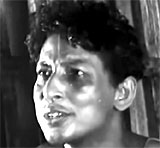
Harihar
"Hari" Ray (Kanu Bannerjee)
|
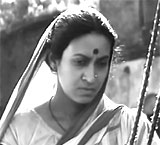
Sarbojaya Ray (Karuna Bannerjee), the Wife
|

Auntie Indir Thakrun (Chunibala Devi)
|
- as the film opened, their young daughter, 6 year-old
Little Durga (Runki Banerjee as young girl) was observed in the household's
compound with the elderly, stooped-backed, toothless, wrinkled
crone - Hari's penniless, story-telling sister - Aunt Indir
Thakrun (Chunibala Devi), who did nothing to discourage the young
and naughty Durga from stealing fruit from the wealthy neighbor's
(the Mukherjees) mango-guava fruit grove and garden once owned
by her family, but had to be relinquished to pay Hari's brother's
debts
- the burdened and stressed Sarbojaya continually
scolded the Auntie for encouraging the spoiled and often lazy but
clever Durga to commit thievery of fruit for her, and for stealing
oil, salt, and chilis from the family's kitchen (over
an eight year period)
- the film's point-of-view would be told through the
eyes of Durga and her mother; after their
youngest child, Apu (Subir Banerjee) was joyfully born into the family,
the film jumped ahead to six years later, as small-framed Apu and
his free-spirited older sister Durga (Uma Das Gupta as older) often
played together
- the film surveyed the progression of simple daily
life and survival, including meal preparation, the children as mischievous
playmates who without money, chased after the traveling, pot-bellied
sweets (candy) vendor Chinibas (Haren Banerjee) (who advertised
"Delicious fried cream, sweet lentil balls, coconut candies,
chandrapuli, sweet cheese balls"); the two siblings often
played childhood games, teased and squabbled with each other, and
experienced the world together
- problems arose when Durga was accused of stealing
a beaded necklace from Tunu, the daughter of their rich Mukherjee
neighbors; although Durga and her mother claimed her innocence,
the accusations were troubling and distressing for Sarbojaya, who
heard the daughter's gossipy mother also decry her as a thief for
raising a child with the propensity to steal: "Like mother, like
daughter: a pair of thieves"; afterwards, Sarbojaya angrily dragged
Durga by the hair as punishment
- Durga often socialized with her neighboring young
girlfriends and spoke to Ranu Mukherjee (Rama Gangopadhaya) who
told her that she was already engaged to be married in a few months
time; Durga and Apu attended a local folk-dance musical theatre
production put on by an itinerant troupe of performers (featuring
a sword fight between a Warrior and a Serpent King), exciting Apu's
imagination
- an argument erupted between them when the childish Apu stole some silver paper
from Durga's toy-box to construct a make-believe crown for himself;
their mother broke the two of them up, and harshly reprimanded
her now-adolescent daughter: "You're
too old for a toy box now" - it was a defining moment for the two
siblings who were now defined and separated by their ages; Durga
called her brother "stupid" for dressing up as a prince
- Apu chased after Durga as she ran a long distance through an adjacent
meadow of tall grass and rice fields; along the way, they stopped
to listen to the humming sound of electrical power in an energy
grid tower; they came upon distant railway tracks to await the
thundering roar and whistling of an approaching train; the two
watched in awe and were thrilled to see a big steam engine pass
by (a symbol of promise and a more modern world of the future)
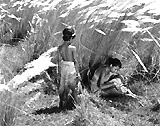
|
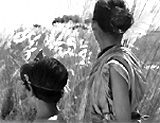
|
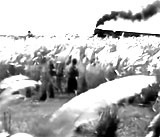
|
Durga and Apu in a Tall Meadow of Grass and Rice
Fields
- Watching a Passing Train
|
- parallel to this narrative part of the story, Sarbojaya
cast the Auntie out of the household for bringing more embarrassing
shame by selfishly begging for a shawl from a relative and
for not helping to support the family; the Auntie departed and
was allowed to stay in a nearby home for a few days;
but then the old woman returned to the family home, not feeling
well, to live out her last days: ("I'd like to spend my last
days in the old home"), Indir was again heartlessly ordered to
leave by Sarbojaya (who watched without saying goodbye)
- as the happy children returned home on their way
back from viewing the train, they discovered their Auntie's slumped-over
dead body in the forest
- the next day, the family's head of household Harihar
Ray departed, promising to find work for a farmer in a nearby market
town; as he walked from the village, he gave his children a few coins
to view pictures through the street vendor's captivating
bioscope; Hari's promised work for a bereaving
farmer wasn't possible, and he was forced to continue
to search for work farther away (relayed through a postcard to
his wife)
- Hari was absent for many months without any
communication with his family; the impoverished Sarbojaya became
desperate for food and was forced to pawn off her dowry kitchenware;
the proud Sarbojaya became ashamed when a neighbor
offered her money; promising news came by letter that Hari was
soon returning home with money
- one of the film's most dramatic sequences was of
torrential, destructive and deadly monsoon rains that flooded
the landscape, prefaced by the dance of water spiders on the surface
of the pond; it brought a lethal chill of pneumonia to Durga after
she impulsively played too long outside during the initial downpour;
when a doctor said there was no cause for alarm, she promised Apu to return to see the train
after she recovered, before she became very ill
- the storm's whistling winds shook the door of their
hut and were accompanied by the image of Ganesh (the beloved, good-luck
Hindu deity with an elephant's head) illuminated by the flickering
flame of an oil lamp; Durga perished from fever and respiratory exposure in the arms of her mother; the
flame went out - and the statue of Ganesh was then only visible during
lightning flashes and strikes; Sarbojaya was absolutely grief-stricken and in shock
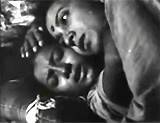
Durga's Severe Illness and Death
|
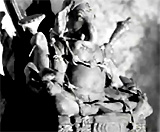
Statue of Elephant-Headed Ganesh - Seen in Flashes of Lightning
|
- the next day, Hari returned
home after being long-overdue - coming back after
five months of seeking work; he was stunned by the devastation of the
village and the intense quiet at his home; however, he was also jubilant
about his good luck, bringing back money and gifts of a wooden pastry-board
and rolling pin, and a picture of goddess Lakshmi for his wife; when
he handed his wife the gift of a new sari for Durga, she
sobbed and sank to the ground clutching the gift; in
the film's most eloquent wordless, grieving moment, Hari realized
that his daughter Durga had died in his absence
- in the film's conclusion set a few days later, the family was packing
up - forced to move and make a bittersweet departure from
Hari's ancestral home (of three generations) to the city of Benares
to find better living conditions; just prior to the family's departure,
Apu was astounded to discover the beaded necklace that Durga denied
having stolen, hidden in a half-coconut shell on a shelf; to cover
up her theft and discard the evidence, Apu threw it into the nearby
pond water where it was submerged and concealed under the algae
- the final image, after a view of a snake slithering
into their abandoned home, was of the stoic family sitting on the
back of a bullock-cart, headed toward Benares and the ghat on the
Ganges River referenced earlier where priests could make money by
singing and reciting from the scriptures
|
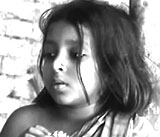
Little Durga (Runki Banerjee)
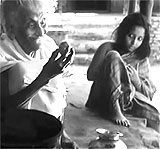
Little Durga With Her Auntie
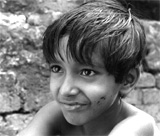
Young Apu (Subir Banerjee)
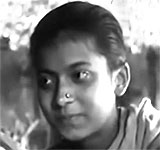
Older Durga (Uma Das Gupta as older)
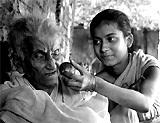
Auntie Indir with Older
Durga - Still Providing Her With Stolen Fruit

Young Apu with His Mother
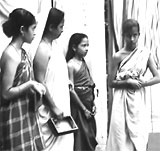
Durga (on right) Accused of Stealing Neighbor Daughter's Beaded Necklace
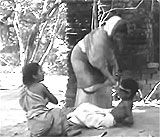
Mother Breaking Up Argument Between Durga and Young Apu: "You're too old
for a toy-box now"
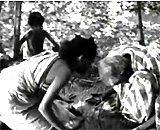
Durga and Apu Returning Home to Find The Slumped Over Dead Auntie
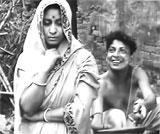
Hari With Presents For His Somber Wife
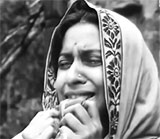
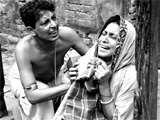
Wife's Grieving Reaction to the Gift of a Sari for Durga
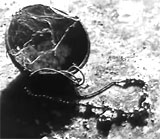
Apu's Discovery of the Stolen Beaded Necklace
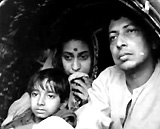
Family's Departure on an Ox-Cart to Find a New Home in
Benares
|















